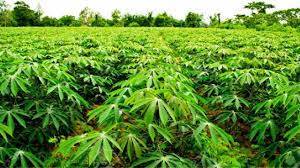Cassava Basics
What is cassava
Cassava, also known as manioc or yuca, is a starchy root vegetable that is a staple food in many tropical regions of the world. It is native to South America but is now cultivated in various countries across Africa, Asia, and Latin America. Cassava has a thick brown outer skin and white or yellowish flesh inside.
Cassava is a versatile crop that can be prepared and consumed in different ways. It can be boiled, steamed, fried, or baked. The roots can be ground into flour to make various products such as bread, cakes, and pastries. Cassava is also used to produce tapioca pearls, which are commonly used in desserts and bubble tea.
Cassava is valued for its high carbohydrate content and is an important source of energy for millions of people around the world. It is relatively drought-tolerant and can grow in poor soil conditions, making it a crucial food security crop in regions with challenging agricultural conditions. Additionally, cassava leaves are sometimes used as a vegetable and can be cooked and consumed like spinach or used in soups and stews.
However, it's important to note that cassava contains naturally occurring cyanogenic glycosides, which are toxic compounds. If not properly processed, these compounds can release cyanide, which is harmful to humans. Traditional processing methods, such as soaking, fermenting, and cooking, are used to detoxify cassava and make it safe for consumption.
Cassava's Health Benefits
Cassava benefits
Cassava, also known as yuca or manioc, is a starchy root vegetable that is widely consumed in many parts of the world. It offers several health benefits due to its nutrient content and unique properties. Here are some of the benefits of cassava:
Rich in carbohydrates: Cassava is a good source of carbohydrates, which are the primary source of energy for the body. It provides sustained energy, making it a valuable food source for individuals engaged in physical activities or needing a calorie-dense food.
Gluten-free: Cassava is naturally gluten-free, which makes it an excellent alternative for people with celiac disease, gluten sensitivity, or those following a gluten-free diet.
High in dietary fiber: Cassava contains a significant amount of dietary fiber, particularly in the form of soluble fiber. Fiber is essential for maintaining a healthy digestive system, regulating bowel movements, and preventing constipation.
Good source of vitamins: Cassava is a good source of various vitamins, including vitamin C, thiamine (vitamin B1), and folate (vitamin B9). Vitamin C is an antioxidant that helps protect cells from damage, while thiamine and folate are important for energy metabolism and the production of red blood cells.
Mineral content: Cassava contains minerals such as potassium, magnesium, and manganese. Potassium is crucial for maintaining proper heart function and regulating blood pressure, while magnesium is important for bone health and various enzymatic reactions in the body. Manganese acts as a cofactor for several enzymes involved in metabolism.
Antioxidant properties: Cassava contains compounds with antioxidant properties, such as phenolic compounds and flavonoids. These antioxidants help neutralize harmful free radicals in the body, reducing the risk of chronic diseases like heart disease, cancer, and age-related macular degeneration.
Resistant starch: Raw or cooked and cooled cassava contains resistant starch, which acts as a prebiotic. Resistant starch is not digested in the small intestine but instead reaches the colon, where it serves as food for beneficial gut bacteria, promoting a healthy gut microbiota.
It's worth noting that cassava should be properly processed before consumption to remove naturally occurring toxins, such as cyanogenic glycosides, which can be harmful if consumed in large amounts. Additionally, cassava should be eaten as part of a balanced diet and not as the sole source of nutrition.



No comments yet
Be the first to share your thoughts!